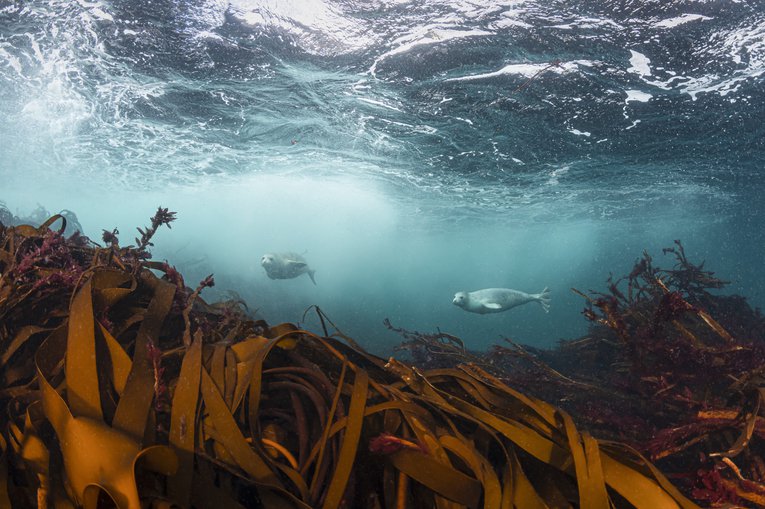
Positive ocean news: August '24 edition
From the discovery of a new species to the successful rearing of rare seabirds and the launch of a rewilding project, there's plenty of ocean optimism to be had this month.
Rainbow sea slug discovered in Devon rockpool

Credit: Paul Naylor (marinephoto)
A species of sea slug usually found in the Mediterranean has been spotted in a Devon rockpool, in what’s thought to be the first recording of the creature in the area.
15-year-old Felix and her father, Ashley, found the colourful sea slug near Plymouth, in what Dr Paul Naylor, a marine biologist and photographer, has called an "an amazing find".
The animal is type of Aeolid nudibranch, which is a family of brightly coloured sea slugs. The sighting is the first in the Wembury Marine Conservation Area, with the few similar discoveries in the UK occurring in Cornwall and the Isles of Scilly.
Felix and her father reported the find to the Devon Wildlife Trust, which, alongside volunteers, regularly monitors and records climate change indicator species, native and non-native species along Devon’s coast to assess changes in populations.
Read more on the Devon Wildlife Trust website
New mollusc species discovered in Western Cape

Dozens of the new species crawling on the surface of a sea urchin
Credit: Charles Griffiths
A new species of mollusc has been discovered during a study in False Bay, South Africa. Brachiomya ducentiunus measures just 2mm in length and lives between the spines of sea urchins.
The species was discovered during the 1001 Seaforest Species project, which aims to raise awareness of regional kelp bed ecosystems by cataloguing 1001 species found around the South African coastline.
The study, which explored four species of galeommatoidean bivalve, offers new insights into their habitats, biodiversity, interactions and taxonomy.
Paul Valentich-Scott from the Santa Barbara Museum of Natural History, who led the study, said, “by uncovering the hidden lives of these small but ecologically important organisms, we hope to contribute to the broader knowledge of marine biodiversity and the conservation of these unique habitats.”
Read more on the SciTechDaily website
Scottish volunteer marine reserve celebrates 40th birthday

Credit: Lawson Wood, Oceaneye Films
Berwickshire Marine Reserve, Scotland's first and only remaining voluntary marine reserve, marked its 40th year of maintaining the local beaches and inshore waters.
The charity was set up by the local community to protect the area’s habitats and species, such as grey seals, bottlenose dolphins and minke whales, and sea slugs. As well as conserving the local biodiversity, staff and volunteers also raise awareness of the marine environment and promote responsible recreation and sustainable fishing.
To mark its birthday, the charity organised various activities and exhibitions to showcase the Berwickshire coast, including snorkelling and kayaking trips, shore watching, rock formation walks, and a beach clean.
Read more on the BBC website
Rewilding project aims to preserve species from Cornwall’s moors to the sea
As suggested in the name, the project aims to link land and marine-based conservation to help rewild the full range species and habitats of the area. The Par leads into St Austell Bay, which houses one of the UK’s largest subtidal seagrass beds and maerl beds, which provide habitats for a variety of marine species.
As well as reducing agricultural run-off that enters the bay, the project aims to help recover the seahorses, cuckoo wrasse and bull huss living there.
Read more on the Guardian website
Rare seabirds born and reared on Hampshire coast

Credit: Agami Photo Agency
Two roseate tern chicks successfully hatched at the Lymington-Keyhaven Nature Reserve, before later joining their parents on their migration to Africa.
Roseate terns are one of the UK's most endangered seabirds, with an estimated 100 breeding pairs left around Britain’s coast.
This is the first time this species has been recorded breeding and producing chicks in the area. Hampshire County Council, Hampshire Ornithological Society and the RSPB worked together to safeguard the birds’ nest and eggs, putting up fences to deter predators and monitoring the nesting site in an effort to create a safe habitat for birds.
As well as the successful hatching and rearing of the two roseate tern chicks, this has led to the number of other nesting birds increasing, including little terns and common terns, redshanks, ringed plovers and oyster catchers.
Read more on the BBC website
Council identifies marine species needing protection to influence nature restoration plans
Cornwall Council has created a list of ten marine plants, animals and habitats it believes need protected, as part of its development of a nature restoration and recovery plan.
The selected species all play different, but important, roles in supporting marine ecosystems, such as filtering water and improving water quality, providing habitats for marine species, storing blue carbon, and cycling nutrients.
Read more on the Cornwall Council website



